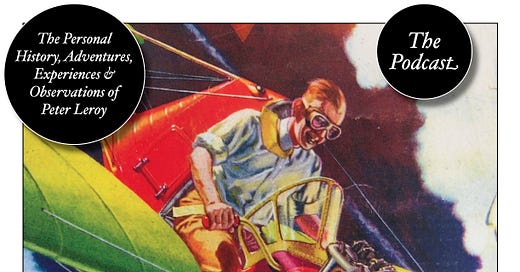Chapter 13
September 22
Local Boy Snaps Shots
Everything we do, we actually do for our own sake. We may appear to be sacrificing ourselves, when we are merely satisfying ourselves.
Denis Diderot
IT IS ALWAYS DIFFICULT to pin down the onset of an idea, but I think that it was this morning, when I surprised Albertine in the kitchen, on her hands and knees, scrubbing the floor, doing a job that we have always paid someone else to do, even in the hotel’s leanest early days, and she looked at me and I saw that she was embarrassed to have been caught saving money this way, embarrassed for me, because she hadn’t wanted me to see that she thought it necessary, or at least prudent, to save money this way, that I really understood how sad she was, how heavily the weight of everything that was a care to her fell on her, and I think that it was at that moment that inspiration struck. I knew that the ultimate target I wanted Rockwell Kingman to pursue was me.
At the time, I thought that the operations of my mind were being conducted in the pursuit of a goal that was purely — let us not say “merely” — literary, that I had been inspired to use my own situation to construct the final chapter of Murder While You Wait and that I would go on to construct the rest of the book to lead up to that chapter. That is what I thought I thought, or, to attempt to be perfectly precise about this, that is what I think I would have thought I was thinking if I had thought about what I was thinking at the time. Someone, a man, a desperate man, would come to Kingman in the hope of employing his skill, and in particular his talent for misdirection, to hide a suicide. He wanted to kill himself — or, if Kingman thought it best, to be killed — so that his wife would collect his insurance money.
His business was failing — some business, any business. Make it a small hotel on a small island. . . .
“Look, here’s the way it is,” he says. He’s wringing his hands. “This morning I happened to see my wife — ”
“It’s an old story,” I say. I light a cigarette. I turn my back to the guy and look out the window. I’m not interested.
“No,” he says. “That’s not the story. Not my story. I surprised her. I saw what she hadn’t wanted me to see. I came into the kitchen and there she was, Albertine, my Albertine, my honey-bunchie-wunchie, on her hands and knees, scrubbing the floor, doing a job that we have always paid someone else to do, even in the hotel’s lean early days, and she looked at me and I saw that she was embarrassed to be caught saving money this way — embarrassed for me, because she hadn’t wanted me to see that she thought she had to save money this way — ”
I open the window, lean out. I see it’s going to be a nice day.
“You see,” he says, and I can hear that pleading tone starting to insinuate itself into his voice, “it was at that moment that I really understood how sad she is, how heavily the weight of — of — everything — every care — every worry — how heavily the weight of every worry falls on her, and that all of that is all my fault.”
He gets up out of the chair. He walks over to the window. He puts his hand on my shoulder. I hate that. I hate the personal appeal. I shrug him off.
“Sorry,” he says. He draws a breath. “It’s my fault, and I’ve got to make amends.” He draws another breath, and then he lays out his plan in the measured voice that people always use when they’re laying out their plans. “When Albertine and I bought the hotel we also bought a life insurance policy on me, enough to cover the mortgage. Over the years, we’ve increased the mortgage to finance repairs and maintenance, but whenever we did we increased the insurance too. If I die an accidental death, she will collect enough to pay off her debts and unload the hotel, which she’s come to think of as a prison. Then she can add whatever is left to what she’s managed to put away in our retirement fund, and she will have — at last — financial security.”
He pauses, and I can tell he’s considering the hand on the shoulder again, the chummy approach. I spin around and look him in the eye to put the kibosh on that.
He holds his hands out, palms up. He sighs. “Security,” he says. “Peace. And I will have provided it. I will be a success.”
As I saw it, Kingman would not be interested. He would find the idea bizarre, even perverted. As a killer, he would find the desire for death impossible to understand. It would take Peter weeks to persuade Kingman to accept him as a client. It would involve riveting discussions of the meaning of life and the meaning of death. I anticipated the writing of those scenes with relish.
[to be continued]
Have you missed an episode or two or several?
You can begin reading at the beginning or you can catch up by visiting the archive or consulting the index to the Topical Guide. The Substack serialization of Little Follies begins here; Herb ’n’ Lorna begins here; Reservations Recommended begins here; Where Do You Stop? begins here; What a Piece of Work I Am begins here; At Home with the Glynns begins here; Leaving Small’s Hotel begins here.
You can listen to the episodes on the Personal History podcast. Begin at the beginning or scroll through the episodes to find what you’ve missed. The Substack podcast reading of Little Follies begins here; Herb ’n’ Lorna begins here; Reservations Recommended begins here; Where Do You Stop? begins here; What a Piece of Work I Am begins here; At Home with the Glynns begins here; Leaving Small’s Hotel begins here.
You can listen to “My Mother Takes a Tumble” and “Do Clams Bite?” complete and uninterrupted as audiobooks through YouTube.
You can ensure that you never miss a future issue by getting a free subscription. (You can help support the work by choosing a paid subscription instead.)
At Apple Books you can download free eBooks of Little Follies, Herb ’n’ Lorna, Reservations Recommended, Where Do You Stop?, What a Piece of Work I Am, and At Home with the Glynns.
You’ll find overviews of the entire work in An Introduction to The Personal History, Adventures, Experiences & Observations of Peter Leroy (a pdf document), The Origin Story (here on substack), Between the Lines (a video, here on Substack), and at Encyclopedia.com.














Share this post